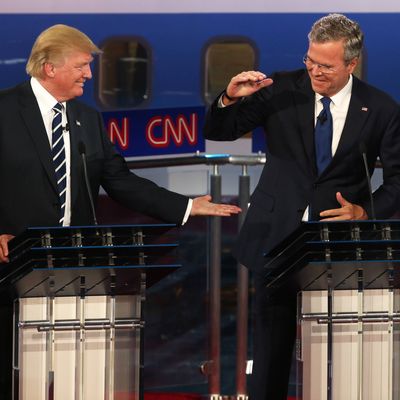
Wednesday night’s Republican presidential debate focused heavily on foreign policy, and the implicit — and at times explicit — question before the panel of hopefuls was “Are you comfortable with giving somebody like Donald Trump access to nuclear weapons?” It’s a perfectly valid source of worry; I, for one, am not. And yet the focus on this scenario distracted from an equally worrisome problem: Should we feel comfortable giving the likes of Jeb Bush and Marco Rubio access to conventional weapons?
The “President Bush with his finger on the military button” scenario is not difficult to imagine, because it was the reality the country lived through for eight years. The exercise did not go well. But the most frightening and consequential fallout from the debate was the near-consensus that George W. Bush had, in fact, handled his duties as commander-in-chief splendidly. Jeb Bush’s most passionate and crowd-pleasing moment came when he insisted, in the face of Trump’s criticism of the Iraq War, that his brother had “kept us safe.” Bush’s campaign considered this rallying moment of the party faithful so successful that, today, it leaned into that moment and made it the centerpiece of Bush’s post-debate message:
It is bizarre to center your defense of Bush having “kept us safe” with a photograph of him standing on the rubble from the worst domestic mass-casualty attack in American history, one that took place under his watch. In 2004, news emerged of a briefing Bush received warning of an impending attack. Subsequent revelations shows that this understates the intelligence Bush had presented to him. The administration dismissed not just one briefing but, as Kurt Eichenwald disclosed three years ago, many warnings of an impending attack by Al Qaeda, believing the intelligence was a disinformation campaign coordinated with Saddam Hussein to distract from Iraq.
Of course, it’s not possible to prove that an administration that actually paid attention to its terror intelligence would necessarily have prevented the 9/11 attacks (some of the perpetrators of which had been arrested or detained beforehand, but were released). But even if you assign the Bush administration zero blame for the 9/11 attacks, it is hard to imagine what credit it deserves for the lack of mass-casualty attacks afterward, given the similar record under Obama. There’s also the fact that Bush invaded Afghanistan in order to capture or kill Osama bin laden and the Al Qaeda leadership, but then, having surrounded them at Tora Bora, let them get away, thereby failing at the primary reason for invading Afghanistan. (The secondary reason, replacing Afghanistan’s government with one not controlled by Islamist radicals, also failed.) Then there was also the whole Iraq War, which was not exactly a safety-enhancing event, either.
None of these enormous failures have registered in the Republican psyche, except insofar as they are voiced by dissidents like Trump and Rand Paul. Chris Christie, rushing to Bush’s defense, claimed, “America was safe for those seven years, and Barack Obama has taken that safety away from us.” How have the seven years after 9/11 — the wonderfully convenient time span universally chosen to defend Bush’s eight years in office — proven more safe than the years that followed under Obama? The answer is tautological: because we had Bush protecting us.
This is why Bush was able to present an image of his brother after 9/11 as a moment of triumph. Foreign policy remains an area Republicans measure as a primitive reflection of machismo. Dubya’s display of alpha manhood overrides any practical assessment of his policies. Jeb appealed to that same zone of the right-wing brain stem.
Trump has attempted to divert that impulse in a slightly different direction. Like the rest of the field, he presented foreign policy as a pure exercise in machismo — only, in Trump’s formulation, success can be analogized to deal-making rather than brawling. (Trump is the only candidate tough and shrewd enough to look Putin in the eye and cut a good deal.) The problem with Obama’s foreign policy, Republicans agree, is that he is pathetic, weak, and vacillating. He must be replaced with a strong leader. Rubio, a candidate with a gift for locating the perfect expression of party doctrine on any issue, announced, “Radical terrorism cannot be solved by intellect.” Indeed, to fully grasp the success of the Bush administration’s policy in quashing radical terrorism, intellect must be tossed aside altogether.






























